

Untitled. The dirt on waste: Modern life is rubbish. At this point in time, the most favoured buzz concept that tries to graft a bit of sustainability onto the essentially expansionary nature of capitalism is the ‘circular economy’.
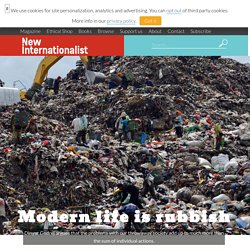
It’s an updated form of extended producer responsibility (which has been around for years) that’s a bit have your cake and eat it. Key is the principle that producers would recalibrate their systems so that their products could be reclaimed by them for the material resources and component parts, and remade into the latest versions which could again be re-sold. Growth but with lower material input. Measuring progress towards the Sustainable Development Goals. Agenda / China. 7 ways towns and cities are turning from grey to green. Urbanization is a fact of modern life, but that doesn’t necessarily mean city dwellers are abandoning nature.
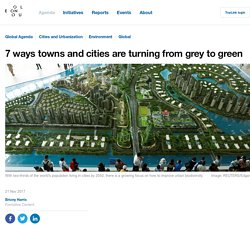
The UN predicts two-thirds of the world’s population will be living in cities by 2050. As people come to terms with the dramatic increase in urbanized areas and the corresponding loss of wildlife, there is a growing focus on how to improve urban biodiversity. While the move towards urbanization cannot be reversed, many cities are finding ways to improve the quality of city life and actively bring wildlife back into cities. These are seven stand-out examples of how cities are learning to nurture plants and wildlife. Endangered Species Condoms. Agenda / Agriculture, Food and Beverage. Theconversation. Asian cities set to benefit most from green growth as US retreats. Asian cities will gain by about $1.5 trillion (£1.1tn) a year by 2030 if predictions on green and sustainable growth are proved correct, with tens of millions of new jobs created, and cities across the region seeing improvements in their liveability and environment.
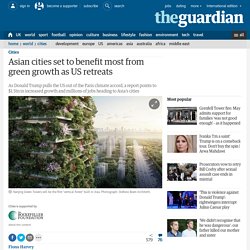
But achieving those goals, and the attendant growth, would be dependent on governments and businesses investing in sustainable cities, and targeting green growth above high-carbon infrastructure. The report, from the non-profit Business and Sustainable Development Commission (BDSC), found that Asian cities would be among the biggest beneficiaries of the move to achieve the global sustainable development goals. It points to improved air and water, better-designed buildings and public spaces, investment in low-carbon transport, and better use of physical resources, with less waste. Secure.greenpeace.org. You currently use over XXX items of plastic in a year!

That sounds like a lot, doesn’t it? UK aid watchdog recommends more direct cash transfers. Image copyright DFID/Save the Children Ministers are being encouraged to expand a scheme which transfers UK aid money directly to those living in poverty in the developing world.

Forbes: Unless It Changes, Capitalism Will Starve Humanity By 2050. Forbes: ‘…Capitalism has generated massive wealth for some, but it’s devastated the planet and has failed to improve human well-being at scale.
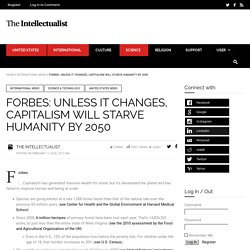
Species are going extinct at a rate 1,000 times faster than that of the natural rate over the previous 65 million years (see Center for Health and the Global Environment at Harvard Medical School).Since 2000, 6 million hectares of primary forest have been lost each year. That’s 14,826,322 acres, or just less than the entire state of West Virginia (see the 2010 assessment by the Food and Agricultural Organization of the UN).Even in the U.S., 15% of the population lives below the poverty line. For children under the age of 18, that number increases to 20% (see U.S. Census).The world’s population is expected to reach 10 billion by 2050 (see United Nations’ projections) World Population. More voices mean smarter cities More voices mean smarter cities Governance for Development. With the ink barely dry on the Sustainable Development Goals, naturally the just-completed Open Government Partnership annual summit focused on how greater openness can accelerate progress toward the goals.
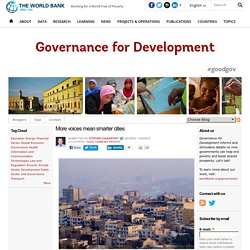
The open government agenda is most closely linked to the ambitious Goal 16 on Peace, Justice and Strong Institutions, which among other targets includes the objective of ensuring “responsive, inclusive, participatory and representative decision-making at all levels.” Though progress in this area is maddeningly difficult to quantify, evidence increasingly shows that participation, the next transparency frontier, matters to development outcomes. Current Population is Three Times the Sustainable Level - World Population Balance - United States world environmentally sustainable population. Global Footprint Network data shows that humanity uses the equivalent of 1.6 planet Earths to provide the renewable resources we use and absorb our waste.1 If all 7+ billion of us were to enjoy a European standard of living - which is about half the consumption of the average American - the Earth could sustainably support only about 2 billion people.
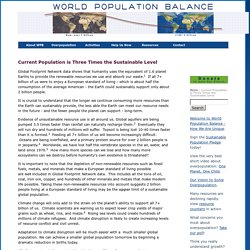
It is crucial to understand that the longer we continue consuming more resources than the Earth can sustainably provide, the less able the Earth can meet our resource needs in the future - and the fewer people the planet can support - long-term. Evidence of unsustainable resource use is all around us. Overpopulation, overconsumption – in pictures. Google. World Climate Change Conference Confirms Near Term Human Extinction - Earth Under Water in Next 20 Years - Full Documentary. World Population to hit 11 Billion in 2100 - Full Documentary. Youtube. Debating the link between emissions and population. There are those who perceive any effort to limit population growth as "population control.
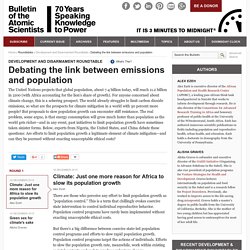
" This is a term that chillingly evokes coercive state intervention to control individual reproductive behavior. Population control programs have rarely been implemented without exacting unacceptable ethical costs. But there's a big difference between coercive state-led population control programs and efforts to slow rapid population growth. Population control programs target the actions of individuals. Efforts to slow the population growth rate, meanwhile, work within existing societal contexts and seek to produce voluntary change. Population size and composition are among the key drivers of climate change. Regions with the heaviest carbon footprints are experiencing slower population growth than other regions. Sub-Saharan Africa's carbon footprint is light. African policy makers do care about the region’s rapid rate of population growth—but climate change is by no means the top reason why.
The Paris climate accord has been approved! Now here's what that actually means for you. For the first time in history, representatives of 195 nations agreed to dramatically reduce greenhouse gas emissions.
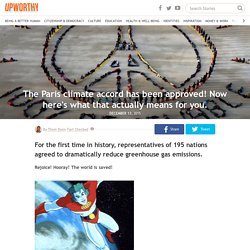
Welcome. Solar module prices have hit a new low. So Akon's trying to bring power to all Africans. Where's the Fairness in the Climate Talks? The Economist. WITH the last votes from Myanmar’s farthest corners finally counted, the country’s electoral earthquake has been officially confirmed. On November 8th the National League for Democracy (NLD), led by Aung San Suu Kyi, won 77% of the seats on offer, while the ruling army’s proxy, the Union Solidarity and Development Party, only managed a humiliating 10%.
Considering that Myanmar was ruled by a brutal military dictatorship just five years ago, and the NLD was banned, with many of its leaders in prison or under house arrest, this is an exhilarating turnaround. Huffingtonpost. Voluntary Birth Control Is A Climate Change Solution Nobody Wants To Talk About. The Economist. China's climate transition. ‘We cannot again allow negotiations on real points of substance to be hijacked in this way,’ wrote Ed Miliband, then Britain’s Energy and Climate Secretary, in the aftermath of UN climate talks in Copenhagen in 2009.
The conference had ended not only with a weak climate deal, but also the widespread impression that China, the world’s biggest CO2 emitter by volume, had been at fault. ‘We did not get an agreement on 50-per-cent reductions in global emissions by 2050, or on 80-per-cent reductions by developed countries,’ Miliband added. ‘Both were vetoed by China, despite the support of a coalition of developed and the vast majority of developing countries.’
British journalist Mark Lynas went further. The big reckoning: how many people did the millennium goals save? Huffingtonpost. Explicit cookie consent. Explicit cookie consent. Eating a Burger or Driving a Car: Which Harms Planet More? They provide us with beef and milk, the gel coating for pills, soap, ice cream, baseballs, and printing ink. New Internationalist. Ten steps towards a better world. Naomi Klein: ‘We don’t have another decade to waste’ Nicaragua’s Grand Canal: more questions than answers. 33 Powerful Animal Ad Campaigns That Tell The Uncomfortable Truth. A little while ago, we wrote about powerful advertisements that were designed to raise awareness about important social and environmental issues. Explicit cookie consent.
Straw into gold: A TED Fellow cultivates mushrooms to reduce emissions. Social entrepreneur Trang Tran is teaching Vietnamese farmers how to use rice straw as a material in which to grow profitable mushrooms, helping to reduce greenhouse gas emissions and improve livelihoods. Photo: Fargreen. Humans have already used up 2015's supply of Earth's resources – analysis. Explicit cookie consent.
Everything we own: Chinese families with all their possessions – in pictures. The denial dam - Geographical.